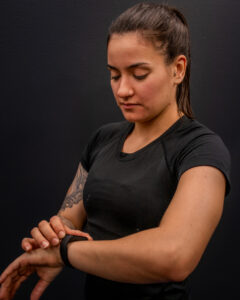Fitness Trackers and Smartwatches – How Accurate Are They?

Since their introduction in the early 2000’s, fitness trackers and smartwatches like FitBit, Garmin, and Whoop have taken the world of fitness and turned energy output into somewhat of an obsession amongst some gym-goers. They are commonly used to track data such as: steps, heart rate, calorie/energy expenditure and sleep. A lot of people take the data presented on their smartwatches at face value, but how do they work? How accurate are they, really?
When it comes to fitness trackers, they typically operate on two different functions. Some use accelerometers and others employ heart rate monitors. Some fitness trackers such as WHOOP and FitBit have both. Accelerometers use your body’s acceleration to estimate energy expenditure. Electromagnetic sensors are used to detect motion, and the device will interpret that information using an algorithm to detect “steps”. Trackers that measure heart rate use equations based upon age, height, gender, weight and activity level, to estimate energy expenditure.
An evaluation conducted at Stanford University School Of Medicine showed that, of seven different trackers evaluated, none of those devices measured energy expenditure accurately. The device with even the highest accuracy was off by an average of 27 percent, with lowest accuracy being off by roughly 93 percent. As you can tell, overestimating or underestimating energy expenditure by even 27 percent provides a huge margin of error when trying to track your goals, and at 93 percent there really isn’t much point. This evaluation did, however, find that most of the devices monitoring heart rate were pretty accurate. The take home message being that if you are using a tracking device to monitor your heart, chances are it can be fairly accurate. Although, it is advised against consuming more calories based on the “expenditure” being provided by your smartwatch. Another more recent study monitored a total of 44 subjects, and had similar findings, showing that the measurement accuracy of energy consumption was still inadequate. Meanwhile, most fitness trackers do reliably measure steps, heart rate, distance, and sleep duration, which can be encouraging data to motivate individuals to become more active.
Devices are constantly being upgraded and redesigned to new models, suggesting the need for more current reviews and research. Although technology is constantly evolving, available research thus far has shown fairly mixed results for how accurate these devices actually are. So are they even worth it? Who should use one? The answer really depends on your goals and what actionable data you are looking to improve. Suffice to say the one thing these devices should not be used for is any kind of calorie expenditure tracking. With almost a 30 percent margin for error at the very minimum, this could definitely lead you to over-consume calories by giving you an inclination that you have burned more than you really have. Be that as it may, fitness trackers and other devices to date have done an excellent job at bringing more regular activity to the forefront, and encouraging more and more people to be more active day to day, which is where the focus should really be. If your FitBit, WHOOP, Apple or Samsung Smartwatch is getting you away from the desk or off the couch more frequently, more power to you and keep up the work. But don’t obsess over the data, just keep in mind that the “calories burned” are not a measurement to rely on by any means, and certainly not the only thing you should be focussed on.